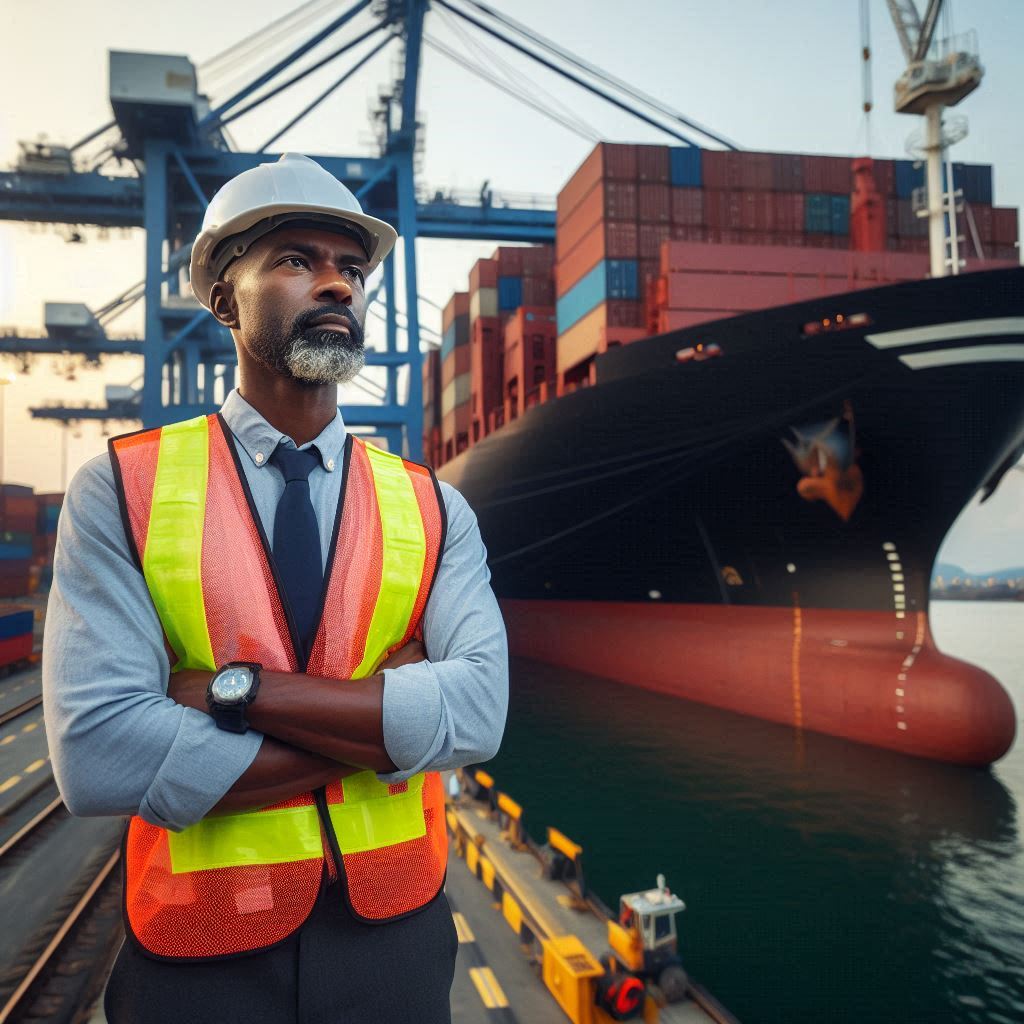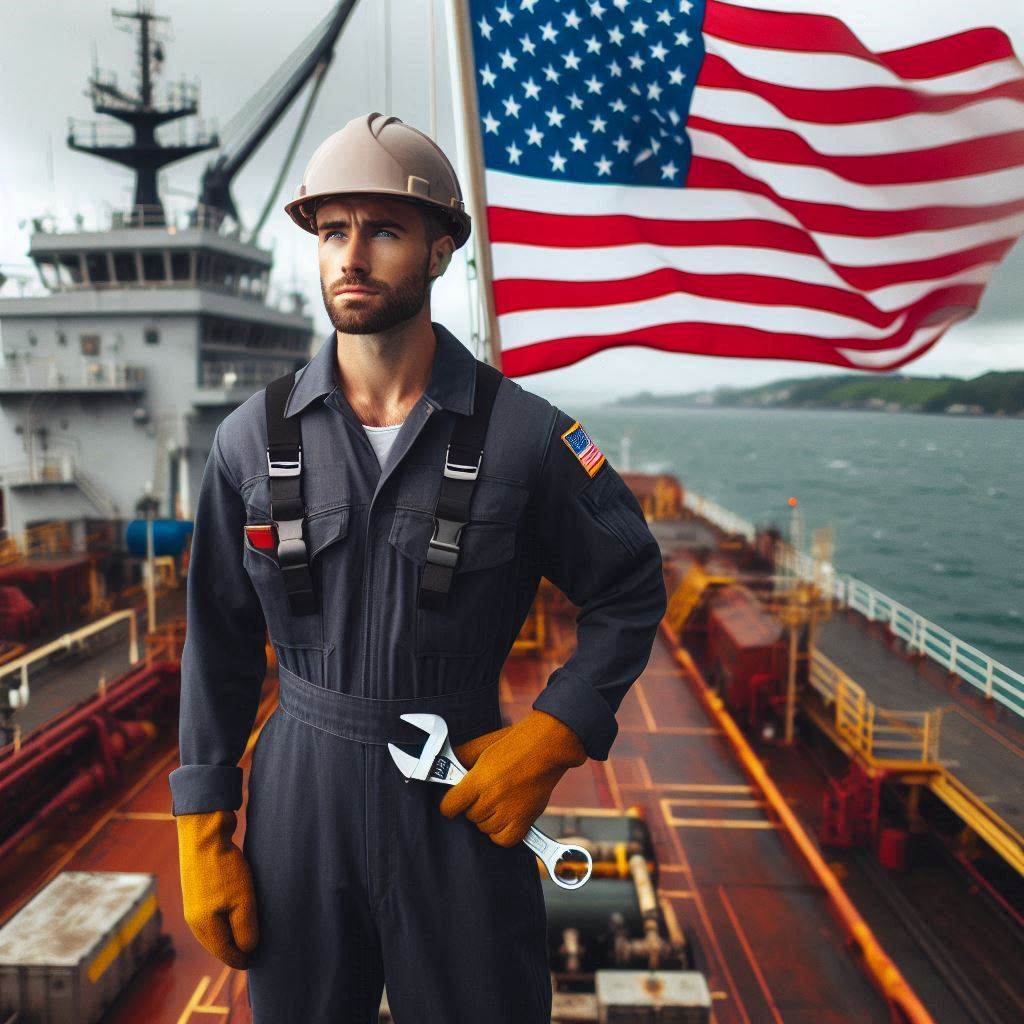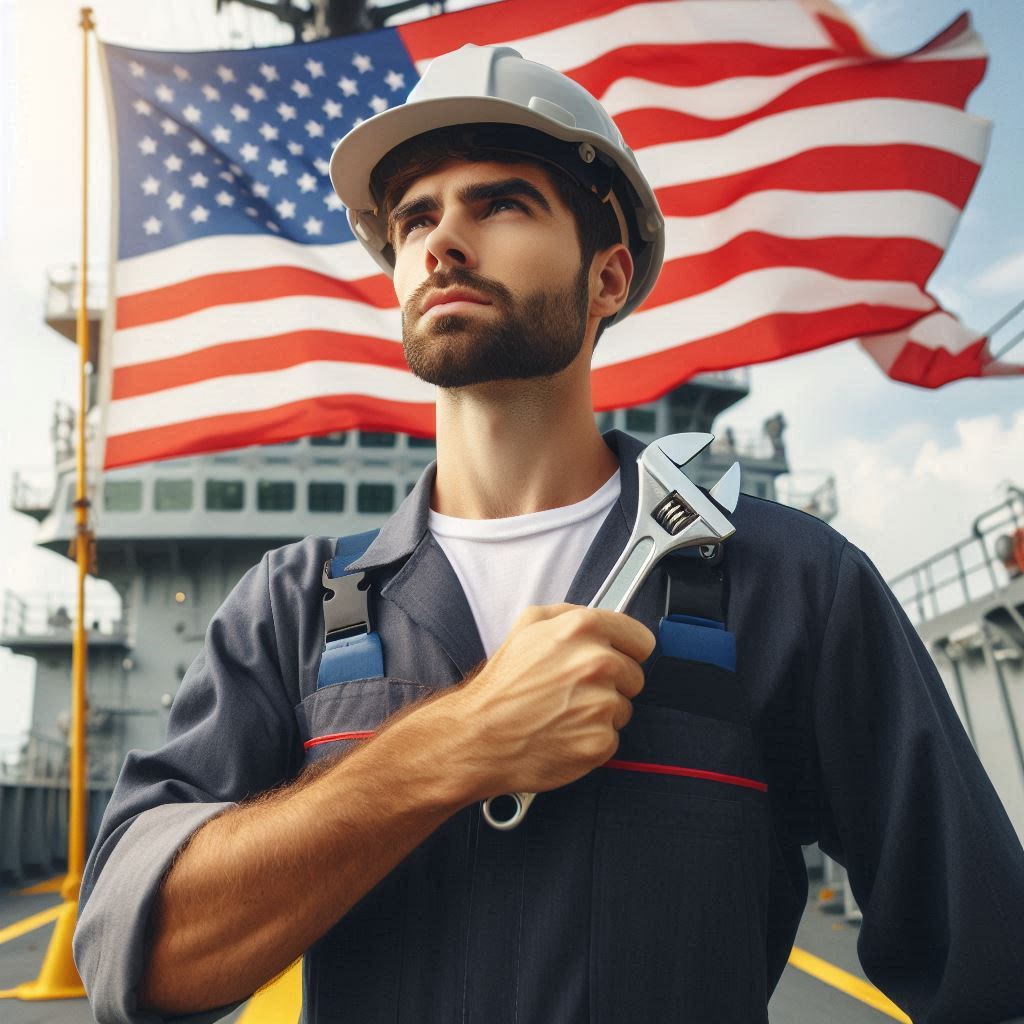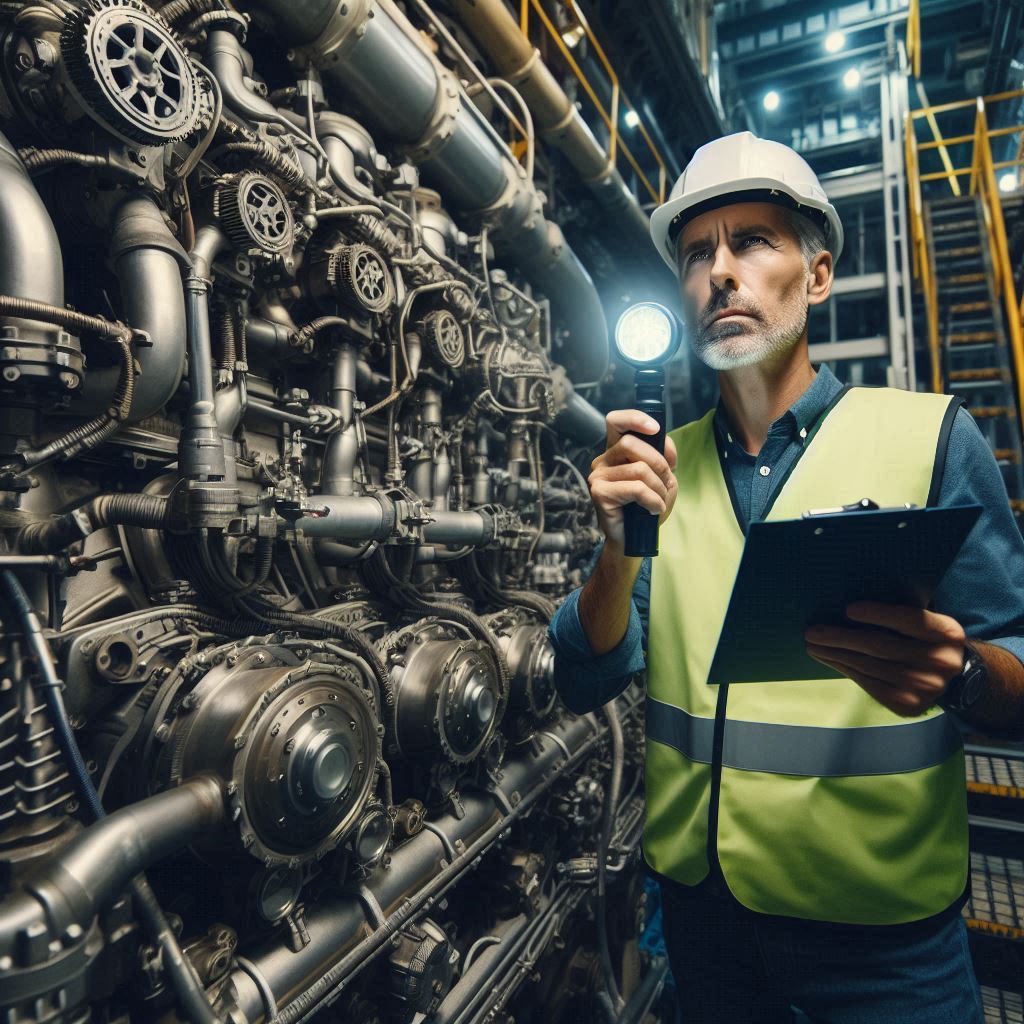Introduction
Marine engineers are responsible for maintaining and repairing ship engines and propulsion systems.
They play a crucial role in ensuring the safe and efficient operation of vessels at sea.
Challenges Faced by Marine Engineers at Sea
One of the major challenges faced by marine engineers at sea is dealing with unpredictable weather conditions.
The constantly changing winds, waves, and currents can make maintenance and repairs difficult.
Moreover, working in confined spaces within the ship’s engine room poses another challenge.
Marine engineers often have to navigate through narrow passageways and cramped quarters to access vital machinery, which can be physically demanding and mentally exhausting.
Another challenge is the isolation that comes with being at sea for extended periods.
Marine engineers may spend weeks or even months away from their families and loved ones, which can take a toll on their mental well-being.
Furthermore, the high-pressure environment of the maritime industry adds to the challenges faced by marine engineers.
They must perform their duties efficiently and effectively under stressful conditions, ensuring the safety of the crew and the ship.
Despite these challenges, marine engineers play a crucial role in keeping vessels operational and safe at sea.
Their expertise and dedication are essential for the smooth functioning of the maritime industry, making them indispensable members of the ship’s crew.
Intense Working Conditions
Marine engineers face intense working conditions at sea.
Their daily routines are marked by long working hours, exposure to harsh weather conditions, and limited access to medical facilities.
Long Working Hours
Marine engineers often endure long working hours that extend beyond the typical eight-hour shift.
Their role demands continuous attention to ensure that engines, machinery, and other critical systems operate smoothly.
This extended schedule is crucial for maintaining the safety and functionality of the ship.
Engineers are responsible for performing routine maintenance and addressing any mechanical issues that arise.
The nature of their job means they must remain vigilant at all times, often working late into the night or early morning.
This relentless schedule can lead to fatigue, which affects their concentration and performance.
To manage this, engineers must carefully balance their time, ensuring they get adequate rest despite the demanding nature of their work.
This balance is challenging but essential for maintaining high safety standards and operational efficiency.
Exposure to Harsh Weatw1her Conditions
Marine engineers routinely face harsh weather conditions that significantly impact their work.
The open sea is subject to unpredictable and extreme weather, including storms, heavy rains, and intense temperatures.
Working on deck during these conditions can be particularly hazardous.
Strong winds and slippery surfaces pose substantial risks of accidents and injuries.
Additionally, engineers must deal with the impact of saltwater corrosion on equipment, which can cause additional wear and tear.
Performing maintenance and repairs under adverse weather conditions requires exceptional skill and speed.
Engineers must adapt quickly to changing conditions and ensure that all equipment remains functional and safe to operate.
The ability to work efficiently in these challenging environments is crucial for the safety and effectiveness of maritime operations.
Limited Access to Medical Facilities
The limited access to medical facilities is a significant challenge for marine engineers.
Ships often operate far from shore, making immediate medical attention difficult to obtain.
In the event of illness or injury, engineers must rely on the basic medical supplies available on board.
Severe cases may necessitate complex and risky emergency evacuations.
This limitation emphasizes the importance of preventive health measures.
Engineers should undergo vaccinations and regular health check-ups before departure to minimize health risks.
Onboard, maintaining a healthy lifestyle through proper diet, exercise, and hygiene is essential.
Additionally, engineers must be proficient in first aid to manage minor injuries and illnesses effectively.
The lack of immediate medical care requires engineers to be self-reliant and prepared for a range of health issues.
These intense working conditions underscore the resilience and adaptability required of marine engineers.
They must manage long working hours, navigate harsh weather, and cope with limited medical resources while ensuring the safe and efficient operation of maritime activities.
Despite these challenges, marine engineers’ dedication and expertise play a crucial role in keeping global shipping operations running smoothly and safely.
Isolation and Limited Communication
Limited Contact with Family and Friends
Marine engineers often face isolation due to limited contact with family and friends.
Life at sea restricts their communication with loved ones, impacting their emotional well-being.
The long durations spent away from home can strain relationships and increase feelings of loneliness.
Dependence on Satellite Communication for Connectivity
Marine engineers depend on satellite communication for connectivity.
This technology enables them to stay in touch with the outside world, but it has limitations.
Satellite communication can be unreliable and expensive, making regular communication challenging.
The quality of the connection can vary, leading to frustrating interruptions.
Psychological Impact of Isolation on Mental Health
Limited communication affects marine engineers’ mental health.
The isolation experienced at sea can lead to feelings of depression and anxiety.
Being away from the support of family and friends can exacerbate these feelings, making it hard to cope with the demands of the job.
The psychological impact of isolation on mental health is significant.
Marine engineers often experience loneliness and homesickness.
The lack of social interaction can lead to a sense of detachment from reality.
This isolation can cause a decline in mental well-being, affecting their performance and safety on the job.
To mitigate these challenges, marine engineers rely on various coping strategies.
They use technology to maintain regular contact with loved ones, despite its limitations.
Video calls and messaging apps help bridge the gap, offering some relief from isolation.
Regular communication with family and friends can provide emotional support and improve mental health.
Companies play a crucial role in addressing the isolation faced by marine engineers.
They invest in better communication systems to enhance connectivity at sea.
Providing access to mental health resources and counseling services is essential.
These measures can help marine engineers manage the psychological impact of isolation and maintain their well-being.
Supporting Marine Engineers in Overcoming Isolation and Limited Communication
Training programs also focus on preparing marine engineers for the isolation they will face.
They teach coping mechanisms and stress management techniques.
These skills are vital for dealing with the mental health challenges associated with limited communication.
Support networks among crew members are also important.
Building strong relationships with colleagues can provide a sense of camaraderie and reduce feelings of isolation.
Team activities and social events onboard can foster a supportive environment, improving mental health and job satisfaction.
Generally, isolation and limited communication are significant challenges for marine engineers at sea.
Dependence on satellite communication and the psychological impact of isolation can affect their mental health.
However, with the right strategies and support systems, marine engineers can manage these challenges and maintain their well-being.
Companies must prioritize better communication systems and mental health resources to support their employees.
By addressing these issues, the maritime industry can improve the quality of life for marine engineers and ensure their continued success at sea.
or employers to provide adequate support and resources to help marine engineers cope with the challenges of isolation and limited communication while at sea.
Safety Hazards
Risk of Accidents and Injuries Onboard Ships
Marine engineers face numerous safety hazards at sea.
One major risk is accidents and injuries onboard ships.
Engine rooms contain various mechanical and electrical systems.
Engineers must navigate these cramped, noisy spaces.
The risk of slips, trips, and falls is high.
Moving parts and hot surfaces add to the danger.
Engineers must remain vigilant and focused at all times.
Any lapse in attention can lead to severe consequences.
Working with Heavy Machinery and Equipment
Working with heavy machinery presents unique challenges.
Marine engineers often handle large engines, pumps, and turbines.
These components are essential for ship operations.
However, they also carry high risks if mishandled.
Proper training is crucial for safe operation.
Engineers must understand the equipment thoroughly.
They should know the correct procedures for maintenance and repairs.
Heavy machinery and equipment pose significant dangers.
These machines require constant maintenance and careful handling.
Importance of Adhering to Safety Protocols and Regulations
Adhering to safety protocols is vital.
Regulations exist to protect crew members.
Marine engineers must follow these rules strictly.
Safety protocols cover various aspects of ship operations.
They include procedures for emergency situations and routine tasks.
For example, lockout-tagout procedures prevent accidental equipment startup.
Personal protective equipment (PPE) is mandatory in many scenarios.
Engineers should wear helmets, gloves, and safety shoes.
Regulatory bodies set stringent standards for marine safety.
The International Maritime Organization (IMO) provides guidelines.
Compliance with these standards is mandatory.
Ship operators must ensure their vessels meet all safety requirements.
Regular inspections and audits verify compliance.
Engineers play a key role in maintaining safety standards.
They must ensure all systems are functioning correctly.
Accident prevention relies on a proactive approach.
Engineers should conduct regular safety drills.
These drills prepare the crew for emergencies.
Scenarios include fire outbreaks, gas leaks, and engine failures.
Engineers must know how to respond swiftly.
Quick action can prevent minor issues from escalating.
Reporting safety hazards is essential.
Engineers should document any potential risks.
This information helps improve safety protocols.
Continuous monitoring of equipment is also crucial.
Engineers should perform regular checks on all machinery.
Identifying wear and tear early can prevent accidents.
Training and education are critical for marine engineers.
Safety courses provide essential knowledge.
Ensuring Safety: Training, Teamwork, and Protocols for Marine Engineers
Engineers should stay updated on the latest safety practices.
Many institutions offer specialized training for marine engineers.
These courses cover a wide range of topics.
They include fire safety, hazardous materials handling, and emergency response.
Working in a team enhances safety.
Engineers should communicate effectively with their colleagues.
Teamwork ensures tasks are completed safely and efficiently.
Engineers should also support each other in maintaining safety standards.
In general, safety hazards are a significant concern for marine engineers.
The risk of accidents and injuries is ever-present.
Engineers must work with heavy machinery carefully.
Adhering to safety protocols is essential.
Continuous training and teamwork enhance safety at sea.
By staying vigilant and proactive, marine engineers can mitigate risks and ensure a safe working environment.
Read: The Future of Environmental Engineering Jobs
Technical Challenges
Maintenance and Repair of Complex Engine Systems
Marine engineers face numerous technical challenges while maintaining and repairing complex engine systems.
The engines used in ships are intricate, requiring constant attention and expertise.
Marine engineers must ensure these engines run efficiently to avoid disruptions.
Maintenance of these systems is critical.
Marine engineers perform regular inspections to identify potential issues before they escalate.
They replace worn-out parts and conduct routine servicing to keep the engines in top condition.
This proactive approach helps prevent major breakdowns.
Repairing complex engine systems at sea presents unique difficulties.
Marine engineers often encounter unexpected malfunctions.
Diagnosing these problems requires a deep understanding of the engine’s mechanics.
Engineers must quickly identify the root cause and implement effective solutions to minimize downtime.
Dealing with Equipment Malfunctions in the Middle of the Sea
When equipment malfunctions occur in the middle of the sea, it poses a significant challenge.
Marine engineers must address these issues promptly to ensure the vessel’s safe operation.
They work under pressure, often in adverse conditions, to repair the faulty equipment.
Marine engineers rely on their training and experience to troubleshoot problems.
They use specialized tools and techniques to fix issues efficiently.
Quick and accurate problem-solving is essential to maintaining the ship’s operational integrity.
Continuous Training and Skill Development Required
Continuous training and skill development are crucial for marine engineers.
The maritime industry constantly evolves, introducing new technologies and systems.
Marine engineers must stay updated with these advancements to handle modern equipment effectively.
Training programs and certifications play a vital role in skill enhancement.
Marine engineers participate in workshops, courses, and hands-on training sessions.
These programs cover various aspects of marine engineering, including new engine technologies, safety protocols, and maintenance practices.
Skill development is an ongoing process for marine engineers.
They regularly update their knowledge to keep pace with industry changes.
This commitment to learning ensures they can tackle the technical challenges they face at sea.
Marine engineers also collaborate with their peers to share knowledge and best practices.
This exchange of information helps them stay informed about the latest developments and solutions to common problems.
Networking with other professionals in the field is essential for continuous improvement.
In addition to technical skills, marine engineers must develop problem-solving and decision-making abilities.
They often work in isolated environments with limited resources.
Quick thinking and effective decision-making are crucial for addressing technical challenges efficiently.
Marine engineers must also be adept at using advanced diagnostic tools.
These tools help them pinpoint issues accurately and implement appropriate solutions.
Familiarity with these tools enhances their ability to maintain and repair complex engine systems.
The technical challenges faced by marine engineers at sea are demanding but manageable with the right skills and training.
Continuous learning and adaptation are key to overcoming these challenges.
Marine engineers play a crucial role in ensuring the safe and efficient operation of vessels, making their expertise invaluable in the maritime industry.
Read: How to Stay Updated in Environmental Engineering Field

Environmental Regulations
Compliance with Strict Environmental Regulations
Marine engineers face strict environmental regulations.
Compliance ensures the protection of marine ecosystems from pollution and other harmful effects.
These regulations cover emissions, waste management, and the use of hazardous materials.
Adhering to these rules requires constant vigilance and thorough knowledge of the latest standards.
Compliance with strict environmental regulations involves several steps.
Marine engineers must monitor emissions to reduce pollutants released into the air.
This includes using cleaner fuels and maintaining engines to meet emission standards.
Regular checks and maintenance ensure that equipment functions within legal limits.
Transform Your Career Today
Unlock a personalized career strategy that drives real results. Get tailored advice and a roadmap designed just for you.
Start NowImpact of Pollution on Marine Ecosystems
Pollution significantly impacts marine ecosystems.
Oil spills, plastic waste, and chemical discharges disrupt marine life and habitats.
Marine engineers work to minimize these risks by implementing proper waste management systems.
Segregating and disposing of waste correctly helps reduce the environmental footprint of ships.
Marine engineers ensure that waste is properly segregated, treated, and disposed of.
They implement systems for recycling and reusing materials.
Reducing waste and managing it responsibly minimizes the ship’s environmental footprint.
Marine engineers also address the impact of noise pollution.
They use technologies to reduce noise emissions from engines and machinery.
This protects marine life sensitive to underwater noise.
Quieting technologies improve the overall sustainability of maritime operations.
Implementation of Eco-friendly Practices on Board Ships
Eco-friendly practices on board ships are crucial for sustainability.
Marine engineers play a key role in adopting green technologies.
These include energy-efficient engines, waste heat recovery systems, and alternative energy sources.
Utilizing renewable energy, like solar and wind power, reduces dependency on fossil fuels.
To comply with environmental regulations, marine engineers must stay updated on changes in laws.
They attend training sessions and workshops to learn about new standards and technologies.
This continuous education ensures that they can implement the best practices on board.
Regular inspections and audits help ensure compliance.
Marine engineers conduct routine checks to identify potential issues early.
They also prepare for external inspections by regulatory bodies.
These inspections verify that ships meet all environmental standards and operate within legal limits.
Implementing eco-friendly practices involves using advanced technologies.
Ballast water treatment systems prevent the spread of invasive species.
Marine engineers install and maintain these systems to ensure they function effectively.
Properly treated ballast water protects local ecosystems from harmful organisms.
Energy efficiency is another focus for marine engineers.
They optimize engine performance to reduce fuel consumption and emissions.
This involves regular maintenance and adopting new technologies.
Energy-efficient engines and propulsion systems significantly lower the environmental impact of ships.
In summary, marine engineers face significant challenges with environmental regulations.
Compliance requires ongoing education, rigorous monitoring, and the implementation of eco-friendly practices.
Their efforts are crucial in minimizing pollution and protecting marine ecosystems.
Adopting green technologies and energy-efficient practices helps ensure the sustainability of maritime operations.
Read: Public Health and Environmental Engineering
Crew Management Issues
Cultural Differences Among Crew Members
Marine engineers face notable challenges due to cultural differences among their crew members.
These differences encompass a wide range of factors, including varying customs, traditions, and work ethics.
For example, a crew member from one culture might approach problem-solving differently than another from a different background.
Such differences can lead to misunderstandings and conflicts if not managed properly.
Marine engineers must cultivate an environment where cultural diversity is appreciated and respected.
Implementing cultural sensitivity training and promoting open dialogue can help bridge these gaps.
Understanding and valuing each crew member’s background can enhance teamwork and cooperation, ultimately leading to a more cohesive crew.
Language Barriers Leading to Miscommunication
Language barriers are another significant challenge in crew management at sea.
When crew members speak different languages or have varying levels of proficiency in the common language, miscommunication is a common issue.
Even when a common language is used, differences in accents and dialects can lead to misunderstandings.
Miscommunication can have serious consequences, especially when it pertains to safety protocols and operational instructions.
To address these issues, marine engineers should prioritize clear and effective communication.
Providing language training or using translation tools can help reduce misunderstandings.
Ensuring that all crew members understand critical instructions and safety procedures is essential for smooth operations.
Resolving Conflicts and Maintaining a Harmonious Work Environment
Resolving conflicts is crucial for maintaining a harmonious work environment aboard a ship.
Conflicts among crew members can disrupt work, lower morale, and affect overall efficiency.
Marine engineers need to address conflicts promptly to prevent them from escalating.
Effective conflict resolution involves listening to all parties involved and understanding their perspectives.
Establishing a clear conflict resolution protocol can help ensure that issues are handled fairly and consistently.
An impartial mediator can be instrumental in resolving disputes and finding acceptable solutions for all parties.
Regular team-building activities can also play a significant role in enhancing crew cohesion.
These activities provide opportunities for crew members to interact in a non-work setting, helping to build stronger relationships and reduce potential conflicts.
Basically, managing a crew at sea involves navigating complex issues related to cultural differences, language barriers, and conflicts.
By fostering an environment of respect and understanding, marine engineers can improve communication and collaboration among crew members.
Effective conflict resolution and proactive strategies to address language and cultural challenges can enhance crew cohesion and operational efficiency.
Ultimately, creating a supportive and inclusive work environment is key to ensuring that the crew functions smoothly and effectively.
Read: Environmental Engineering Software and Tools
Coping with Homesickness
Missing Family Occasions and Special Moments
Marine engineers often face the emotional challenge of missing significant family occasions and special moments while working at sea.
Being away from home means missing out on birthdays, anniversaries, holidays, and other important life events.
These occasions are important for bonding and celebrating milestones with loved ones.
The absence from these events can lead to feelings of isolation, loneliness, and sadness.
The sense of missing out on cherished moments can create an emotional strain that affects both personal and professional well-being.
Finding Ways to Stay Connected with Loved Ones
To manage the emotional impact of missing family occasions, marine engineers need to find ways to stay connected with their loved ones.
Modern technology offers various tools to help maintain communication despite the physical distance.
Regular video calls, emails, and instant messaging apps can help bridge the gap between engineers and their families.
Setting up scheduled calls with family members can provide a sense of routine and consistency.
Engaging in real-time communication helps preserve relationships and keeps engineers informed about family happenings.
Social media platforms also provide an opportunity to share updates and stay involved in family events remotely.
Strategies for Managing Homesickness and Staying Motivated at Sea
Managing homesickness effectively is crucial for maintaining mental health and motivation while at sea.
Several strategies can help marine engineers cope with the emotional challenges of being away from home.
- Developing a Personal Routine: Creating a structured daily routine onboard can offer a sense of normalcy and control. Establishing regular meal times, exercise routines, and personal hobbies can provide stability and help pass the time more comfortably.
- Engaging in Onboard Activities: Participating in social activities and hobbies available on the ship can serve as effective distractions from feelings of homesickness.
Joining sports teams, attending social gatherings, or pursuing personal interests can provide enjoyment and foster a sense of community with fellow crew members. - Building a Support Network: Establishing a support network with colleagues can be incredibly beneficial.
Sharing experiences, discussing feelings, and supporting one another can create a sense of camaraderie and mutual understanding. Open conversations about homesickness can normalize these feelings and reduce their emotional impact. - Maintaining a Positive Mindset: Staying motivated involves focusing on the purpose and goals of the assignment. Reminding oneself of the achievements and opportunities that come with working at sea can provide a sense of accomplishment.
Maintaining a positive outlook helps shift attention away from homesickness and towards professional and personal growth. - Seeking Professional Support: In some cases, additional support may be necessary.
Accessing mental health resources or speaking with a counselor can offer coping strategies and professional guidance. Understanding that homesickness is a common experience can help in managing its effects more effectively.
By employing these strategies, marine engineers can better handle the emotional challenges of being away from home.
Staying connected with loved ones, engaging in meaningful activities, and focusing on the positives of the job are key to managing homesickness and maintaining overall well-being while at sea.
Conclusion
Marine engineers face numerous challenges at sea that test their skills and resilience.
They encounter harsh weather conditions, complex machinery issues, and logistical constraints.
Dealing with unpredictable seas and mechanical failures demands a high level of technical expertise and problem-solving ability.
Additionally, the isolation from shore-based support adds to the complexity of their job.
Marine engineers must also adapt to diverse and ever-changing environments on different vessels.
Resilience is crucial for marine engineers.
They need to remain calm and focused under pressure, ensuring that they effectively manage emergencies.
Teamwork is equally important.
Engineers often work alongside crew members to troubleshoot problems and execute solutions swiftly.
Effective communication and collaboration among the crew help in addressing issues more efficiently and maintaining operational safety.
Adaptability is a key trait for marine engineers.
Each voyage can present unique challenges, from unexpected equipment malfunctions to severe weather conditions.
Engineers must be flexible and ready to modify their approach to tackle unforeseen issues.
This ability to adapt helps in maintaining the vessel’s performance and ensuring the safety of everyone on board.




